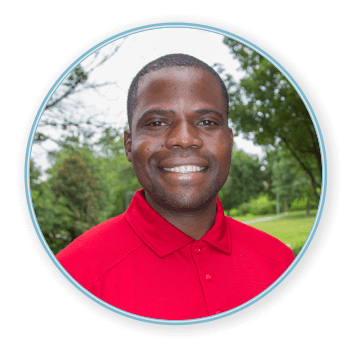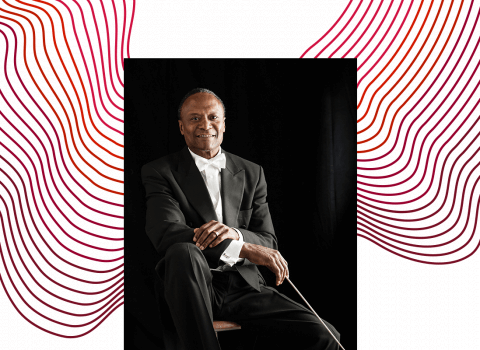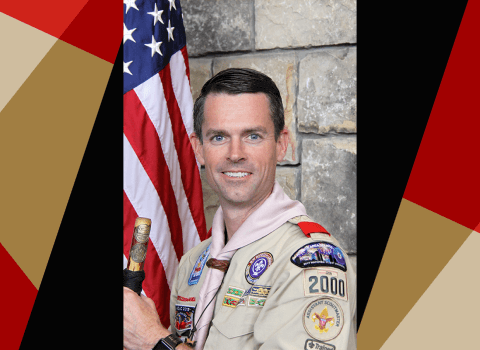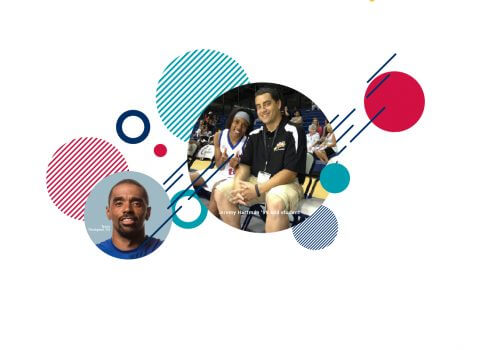Amado Mukhambe ’08 works from 7:15 a.m. until 10 p.m. or 11 p.m. most weekdays as an instructor at Universidade Eduardo Mondlane in Maputo, Mozambique. With 40,000 students, the university’s classes usually hold 75 to 100 students — far more than typically seen at Shenandoah University, where Mukhambe earned his Master of Science in Education.
Mukhambe returned to Shenandoah in July 2015 as part of his first visit to the United States since 2008. This time around, he brought his wife (her first airplane trip) and two-year-old daughter with him.

“It’s really a great blessing to be a part of Shenandoah University,” said Mukhambe, the son of a peasant farmer and survivor of a civil war that turned his family in to nomads for years as their homes and schools were attacked and teachers killed. He estimates he lost 60 percent of his family, including his brothers, in the 1977–1992 conflict. “My education was delayed because of war.”
Regardless, he always remained dedicated to his education, no matter how difficult it was to acquire. People would tell him, in his youth, that they believed he was called to study law, or be a minister, perhaps. He agreed with what everyone said, but would tell them he was powerfully pulled toward another career. “I think the most important thing that I’m called to do is to be a teacher,” he said. So, although getting an education was a struggle, he did it, earning an undergraduate degree through a scholarship to Africa University in Zimbabwe before studying for his master’s at Shenandoah.
Now, he’s using his Shenandoah education to train new teachers to teach curriculum design, introduction to curriculum studies and project management in education courses in his own country. He also advises students in need of assistance, helps those working on their dissertations and works with students throughout the country through Mozambique government efforts.
Amado was always eager to learn in the time he had at Shenandoah. He was good at learning first as a student, and second as a prospective teacher-educator who would teach the new generations of teachers in Mozambique.
—Mary E. Bowser
He teaches at the undergraduate and graduate levels, training principals, district superintendents, and sometimes, ministers. And through it all, he shares information he learned because Shenandoah invested in him as a student.
“When I got here,” he said of his time at Shenandoah, “I never felt like I was far away from home.” The atmosphere was friendly and supportive, and people socialized like they did back in Mozambique, said Mukhambe, who attended Shenandoah through the assistance of the Virginia Conference of the United Methodist Church, with which the university is affiliated.
Mukhambe said his professors — including Professor of Teaching English to Speakers of Other Languages Liz England, Ph.D., (as he notes as a speaker of the Tswa and Portuguese languages, “English is not my peanut and butter”) and Director of Teacher Licensure and Professor of Curriculum and Instruction Mary E. Bowser, Ed.D. — did so very much for him. President Emeritus James A. Davis, Ph.D.; current President Tracy Fitzsimmons, Ph.D.; and Vice President of Student Life Rhonda VanDyke Colby, D. Min., all played significant roles in bringing Mukhambe to Shenandoah and supporting his studies here.
“He was totally focused on his goals, and never forgot the struggles and challenges he had to overcome in order to be in the master’s program,” Dr. Bowser said as she recalled Mukhambe’s student days. “He is always grateful to those whose generosity and foresight had supported him in his quest for an education, and in his vision for educating his country folk.
“Amado was always eager to learn as much as he could, and do as much as he could in the time he had at Shenandoah. He was so good at learning at two levels: the first as a student, and the second as a prospective teacher-educator who would teach the new generations of teachers in Mozambique,” Bowser added.
“He is amazing. His energy and enthusiasm are contagious because of his sincerity, his belief in the pedagogy, his faith in his people, and his vision for the future,” Bowser said, noting that it feels both awesome and humbling to know that Shenandoah has played such a significant role in his life. “It makes me aware of the true community that we serve in the School of Education & Human Development, and how what we do on a daily basis has such wide-ranging effects. It also makes me feel the pride and responsibility of teacher-educators as a profession, and I am most honored to be in the ranks.”
Mukhambe said it’s hard to fully describe what Shenandoah means to him. The university has made a difference in his life and that of Mozambique, as a nation, “because I see myself as playing a vital role within my community, within my university, and within the nation as a whole.”
Bowser concurs. “I do see him as a leader in his university because he can articulate his vision so clearly. He is also generous with his time and energy for his teaching and his students, because he knows the importance of planting seeds of content knowledge, teaching skills and caring for students, and then watching the ideas take root as the next generations of teachers grow professionally.”
Mukhambe considers himself a source of inspiration to the young people of his village and his country, and he believes that ultimately, the only thing that overcomes poverty is an education. When he visits his village, the children now tell him that they plan to go to university, too.
His former Shenandoah professor, Bowser, couldn’t be more proud of him and his work. “He is a wonderful person whose life is a stunning example of a true blessing,” she said. “I have been blessed to have been his professor for two short years, and I know that his university and country have been blessed by his unwavering faith in God and his steadfast vision for the effects of teacher education.”
His appreciation for, and pride in, Shenandoah runs deep, as well. The university is “committed to the well-being of the world,” he said. “Shenandoah is my home and I am very glad to be a part of Shenandoah.”
A source of inspiration to the people of his village and his country, [Mukhambe] believes the only thing that overcomes poverty is an education. the children of his village now tell him that they plan to go to university, too.






